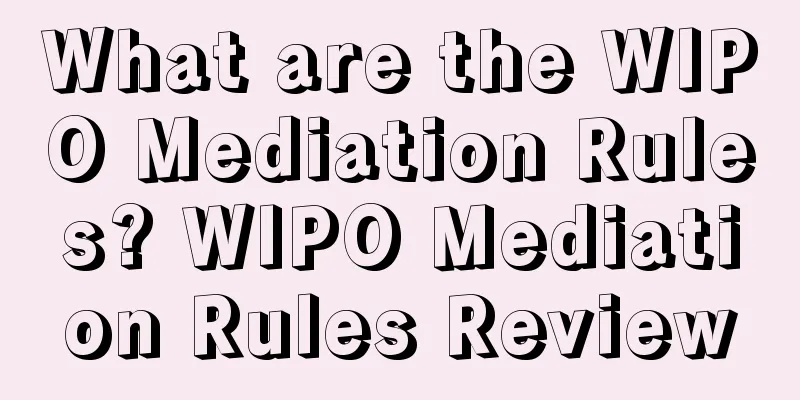What are the WIPO Mediation Rules? WIPO Mediation Rules Review

|
The Rules contain 28 articles, including: scope of application of the Rules, commencement of mediation, appointment of mediators, agents of the parties and participants in meetings, conduct of mediation, role of mediators, confidentiality, termination of mediation, management fees, mediator fees, prepayment, exemption from liability, waiver of defamation rights and termination of statute of limitations, etc. Version 2021-7-01 English version Abbreviations Article 1 In these Rules: "Mediation Agreement" means an agreement by the parties to submit to mediation all or certain disputes which have arisen or which may arise between them; a mediation agreement may be in the form of a mediation clause in a contract or in a separate contract; "Mediator" means a sole mediator or, if more than one mediator is appointed, all of them; “WIPO” means the World Intellectual Property Organization; “Center” means the WIPO Arbitration and Mediation Center. Scope of application of the rules Article 2 Where a mediation agreement provides for mediation to be conducted in accordance with the WIPO Mediation Rules, these Rules shall be deemed to form part of the mediation agreement. Unless the parties agree otherwise, the mediation shall be governed by these Rules in force on the date the mediation commences. The beginning of mediation Article 3 (a) A party to a Mediation Agreement who wishes to commence mediation shall submit a Request for Mediation to the Center and shall send a copy of the Request for Mediation to the other party. The Request for Mediation shall be sent by electronic mail or other electronic means of communication which provides for its record, unless a party decides to also use an expedited postal or courier service. (b) The Request for Mediation shall contain or be accompanied by the following: (i) the names, addresses and telephone, e-mail or other communication information of the parties to the dispute and of the representative of the party submitting the Request for Mediation; (ii) a copy of the mediation agreement; and (iii) a brief description of the nature of the dispute. Article 4 (a) If the parties do not have an Agreement to Mediate, a party who wishes to commence mediation shall submit a Request for Mediation to the Center and shall send a copy of the Request for Mediation to the other party. The Request for Mediation shall include the details set out in Article 3(b)(i) and (iii) above. The Center may assist the parties in considering the contents of the Request for Mediation. (b) Upon the request of a party, the Center may appoint an External Neutral to assist the parties in considering the Request for Mediation. If all parties agree, the External Neutral may act as Mediator. The provisions of Articles 15 to 18 shall apply mutatis mutandis. Article 5 The date on which mediation commences is the date on which the Center receives the Request for Mediation. Article 6 Upon receipt of the Request for Mediation, the Center shall promptly notify the parties in writing, stating the date on which the mediation will commence. Appointment of Mediator Article 7 (a) Unless the parties have otherwise agreed on the selection of a mediator or on another procedure for appointing a mediator, the appointment shall be made in accordance with the following procedure: (i) The Center shall send to all parties an identical list of candidates. The list shall normally contain the names of at least three candidates, listed in alphabetical order. The list shall contain or be accompanied by a statement of the qualifications of each candidate. Where the parties have agreed on any particular qualifications, the list shall include candidates who meet those qualifications. (ii) A party shall have the right to delete the name of any candidate to whom it objects, and any remaining candidates shall be indicated numerically in order of preference. (iii) The parties shall return the marked list to the Centre within 7 days after receiving it. If the parties fail to return the marked list within that period, they shall be deemed to have approved all the candidates included in the list. (iv) After receiving the lists returned by the parties or, if the lists are not complete, after the expiration of the period provided for in the preceding paragraph, the Center shall, as soon as possible, designate a person from the list to act as Mediator, in accordance with the order of preferences and objections raised by the parties. (v) If the list returned does not contain a mediator acceptable to both parties, the Center shall appoint the mediator. The Center shall also appoint the mediator if the person is unable or unwilling to accept the Center's invitation to serve as mediator or there are other reasons that prevent that person from serving as mediator and there is no mediator acceptable to both parties on the list. (b) Notwithstanding the procedure provided for in paragraph (a), the Center shall have the power to appoint a mediator by other means if it determines in its discretion that the case is not suitable for the procedure provided for in that paragraph. (c) By accepting appointment, the potential mediator shall be deemed to have undertaken to make available sufficient time for the mediation to proceed expeditiously. Article 8 The mediator shall be neutral, impartial and independent. Agents of the parties and participants in the meeting Article 9 (a) When the parties meet with the mediator, they may appoint an agent or invite other persons to provide assistance. (b) Immediately after the appointment of the Mediator, a party shall inform the other party, the Mediator and the Center of the name and address of the person authorized to act as its agent and the name and position of the person who will represent it at meetings between the parties and the Mediator. Conduct of Mediation Article 10 Mediation shall be conducted in the manner agreed upon by the parties. If the parties have no agreement, the mediator shall decide the manner in which mediation should be conducted in accordance with the provisions of these Rules. Article 11 The parties should cooperate with the mediator in good faith so that the mediation can proceed as expeditiously as possible. Article 12 The mediator may meet and communicate with one party separately, but the information obtained during the separate meeting and communication shall not be disclosed to the other party without the explicit authorization of the party providing the information. Article 13 (a) As soon as possible after being appointed, the mediator shall consult with the parties and establish a timetable for the parties to submit to the mediator and the other party submissions briefly setting out the background of the dispute, the parties’ interests and claims related to the dispute and the current status of the dispute, together with such other information and materials as the parties consider necessary for the mediation, in particular such other information and materials as may help to identify the issues in dispute. (b) During the mediation process, the mediator may at any time suggest that the parties provide additional information and materials that the mediator considers useful. (c) Any party may at any time submit to the Mediator any written information and materials that the party considers to be confidential, stating that such information and materials are for the Mediator’s review only. The Mediator shall not disclose such information and materials to the other party without the written authorization of that party. The role of the mediator Article 14 (a) The Mediator may assist in resolving the dispute between the parties in any manner the Mediator deems appropriate but shall not have the power to impose any resolution on the parties. (b) If the mediator considers that any dispute between the parties is not likely to be resolved through mediation, he may propose for the parties’ consideration such procedures or methods as he considers will be most conducive to resolving such disputes with the greatest efficiency, the lowest cost and the best outcome, taking into account the circumstances of the dispute and any commercial relationship between the parties. In particular, the mediator may propose: (i) provide expert appraisal on specific issues; (ii) conduct arbitration; (iii) The parties propose final solutions and, if mediation fails, arbitration shall be conducted on the basis of those final solutions. The task of the arbitral tribunal in the arbitration proceedings shall be limited to deciding which final solution to adopt. Confidentiality Article 15 No minutes are kept of the parties' meetings with the mediator. Article 16 All persons participating in the mediation, in particular the mediator, the parties and their representatives and advisors, any independent experts and any other persons participating in the meetings between the parties and the mediator, shall maintain confidentiality of the mediation and shall not use or disclose to any outside party any information related to or obtained during the mediation, unless otherwise agreed by the parties and the mediator. Such persons shall sign an appropriate confidentiality undertaking before participating in the mediation. Article 17 Unless the parties agree otherwise, any person participating in the mediation shall return any submissions, documents or other materials provided by a party to that party at the end of the mediation without retaining any copies. Any notes of the meetings between the parties and the mediator shall be destroyed at the end of the mediation. Article 18 Unless otherwise agreed by the parties, the mediator and the parties may not introduce the following as evidence or in any other manner in any judicial or arbitral proceedings: (i) any views expressed or suggestions made by the parties regarding possible resolution of the dispute; (ii) any admissions made by the parties during the mediation; (iii) any recommendations made or opinions expressed by the Mediator; (iv) a party indicates or fails to indicate a willingness to accept any settlement proposal made by the mediator or the other party; (v) any settlement agreement reached between the parties, unless such submission is necessary for the enforcement of the settlement agreement or otherwise required by law. Termination of Mediation Article 19 Mediation shall be terminated in any of the following circumstances: (i) the parties enter into a settlement agreement in respect of any or all of the issues in dispute between them; (ii) the Mediator decides to terminate the mediation if the Mediator determines that further mediation efforts are unlikely to resolve the Dispute; or (iii) Termination by a written declaration of termination by one of the parties. Article 20 (a) Upon termination of the mediation, the mediator shall promptly send to the Center a written notice of termination stating the date of termination and whether the dispute was resolved as a result of the mediation and, if so, whether partially or in full. The mediator shall copy the notice of termination sent to the Center to each party. (b) The Center shall maintain the confidentiality of a mediator’s notice of termination of mediation and shall not disclose the existence or results of the mediation to any person without the written authorization of the parties, unless such disclosure is necessary for the enforcement of the settlement agreement or as otherwise required by law. (c) However, the Center may use information concerning the mediation in any comprehensive statistics published by the Center on its activities, provided that the information used does not reveal the identity of the parties or enable the specific circumstances of the dispute to be identified. Article 21 Unless required by a court or authorized in writing by the parties, the mediator shall not act in any capacity other than as a mediator in any ongoing or subsequent judicial, arbitral or other proceeding relating to the subject matter of the Dispute. Management Fee Article 22 (a) When submitting a Request for Mediation, the Applicant shall pay to the Center an administration fee in the amount specified in the Schedule of Fees applicable on the date of the Request for Mediation. (b) The Administration Fee is non-refundable. (c) The Center will not act on a Request for Mediation until the Administration Fee has been paid. (d) If a party who has submitted a Request for Mediation fails to pay the Administration Fee within 15 days after the Center’s written reminder for payment, the Request for Mediation shall be deemed to have been withdrawn. Mediator Fees Article 23 (a) The amount and currency of the Mediator’s Fees and the method and time of payment shall be determined by the Center after consultation with the Mediator and the parties. (b) Unless otherwise agreed by the parties and the mediator, the amount of the mediator’s fees shall be calculated in accordance with the indicative hourly or daily rates set out in the Schedule of Fees applicable on the date of the Request for Mediation, taking into account the amount in dispute, the complexity of the subject matter of the dispute and any other relevant circumstances of the case. Prepayment Article 24 (a) The Center may, upon appointing a mediator, require each party to deposit an equal amount as an advance on the costs of the mediation, in particular the estimated fees of the mediator and the other expenses of the mediation. The amount of the deposit shall be determined by the Center. (b) The Center may require a party to make additional deposits. (c) If a party fails to pay the deposit as required within 15 days after the Center’s written reminder, the mediation shall be deemed terminated. The Center shall notify the parties and the mediator in writing of the date of termination. (d) Upon termination of the mediation, the Center shall account for the parties for deposits, if any, and shall refund to them any unused balance or require them to pay any outstanding balance. cost Article 25 Unless the parties agree otherwise, the administration fees, the mediator's fees and all other expenses of the mediation, in particular the mediator's necessary travel expenses and any expenses related to obtaining expert advice, shall be shared equally between the parties. Disclaimer Article 26 The Mediator, WIPO and the Center shall not be liable to the parties for any act or omission in connection with any mediation conducted under these Rules, except for acts in bad faith. Waiver of Defamation Rights Article 27 The parties and the appointed mediator agree that any statements or opinions, whether written or oral, made or used by the parties, the mediator or their agents in preparation for or during the mediation shall not be relied upon in the institution or support of any action for defamation or other related conduct, and agree that this section may be used as a basis for a motion to dismiss any such action. Suspension of statute of limitations Article 28 The parties agree that, to the extent permitted by applicable law, any applicable statute of limitations prescribed by law shall be suspended for disputes submitted to mediation from the date the mediation is initiated to the date the mediation is terminated. References
|
>>: What is dafill? dafill review
Recommend
What is Gaoxiang Logistics? Gaoxiang Logistics Review
Guangdong Gaoxiang International Express Co., Ltd....
Organize five useful tables for optimizing product keywords (automatically generated, optimized keyword table, keyword scoring table)
What I want to share with you today is 5 tables f...
What is BIGO Ads? BIGO Ads Review
BIGO Ads is an advertising platform that provides ...
What is Efficient Era? Efficient Era Review
EfficIENt Era is an all-in-one tool that includes ...
What is IMCART? IMCART Review
IMCART is an open source, free shopping mall syste...
What is the Axe Browser? Axe Browser Review
Zhanfu Browser is a store management system that f...
Baby cradles sold on Amazon and other platforms have been recalled by CPSC due to the risk of falling!
It is learned that the U.S. Consumer Product Safet...
Amazon is being sued by the US government! Is there a solution to the vicious cycle of sellers' price wars?
Recently, the US government has taken action agai...
Amazon warehouse was stolen again! Millions of goods were illegally sold!
Working on Amazon requires three abilities: produc...
What is Dolphin Japan Warehouse? Dolphin Japan Warehouse Review
Shenzhen Dongxing International Warehousing and Lo...
[Practical Tips] How to turn slow-selling products into hot-selling products? Detailed explanation of off-site deals
Unsaleable products are a terrible thing for Amazo...
The "agent operation" gang was arrested, 17 people were criminally detained, and cross-border e-commerce companies were frequently cut off!
Zhengzhou police successfully cracked down on an &...
A manual to close the five illegal operations of Amazon off-site traffic diversion
Amazon’s announcement pointed out that specificall...
Want to make some quick money during Amazon Christmas season? Sharing on-site and off-site product selection/optimization cases!
Christmas is on December 25, 2021. Maomao wrote th...
I have been unemployed for half a year and feel like I have accomplished nothing. I would like to summarize my thoughts on "how to promote new products" and hope to get your supplements and suggestions.
Shiyilang and the gangster My C position Time flie...









